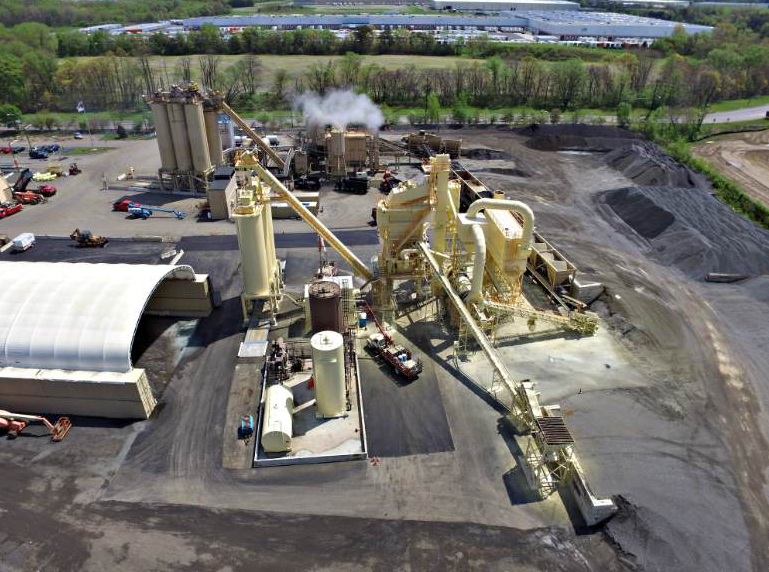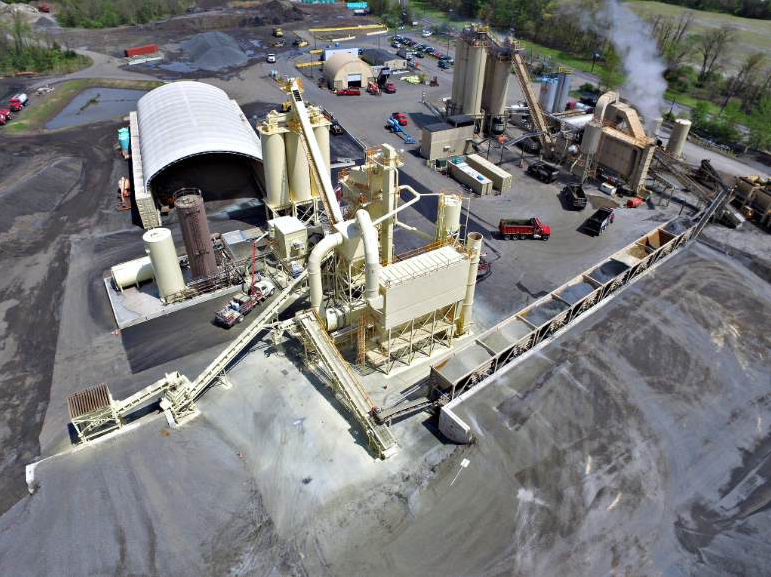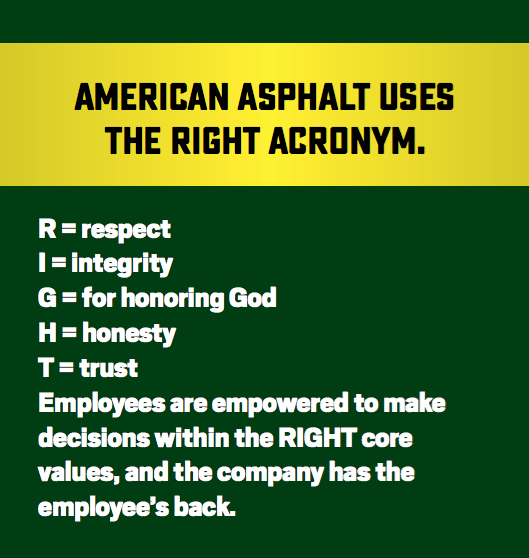American Asphalt Serves Two Plants with One Footprint
BY Sandy Lender

American Asphalt Co., headquartered in West Collingswood Heights, New Jersey, runs two plants side by side on its Burlington Township property. One is a 5-ton Stansteel batch plant. The other is a 400-TPH Dillman duo-drum. Putting the two on the same property made perfect sense from a permitting, footprint and cost standpoint, and inspired the intriguing idea of feeding both plants from one cold feed system. Management at American Asphalt turned to Reliable Asphalt Products in Shelbyville, Kentucky, for some assistance with the setup. Here’s how Production Manager Chris Jennings made that all work out.
Serve the Customer
American Asphalt Owner and President Bob Brown has performed the various jobs at the asphalt plant that his employees are required to do, thus he is aware of what his employees need when it comes to getting the job done right. In a promotional video for American Asphalt, Brown stated, “When I first bought this company, I had four employees and we had a 1-ton asphalt plant here. When I started, the previous owner stayed on and showed me how to operate the plant. So I have a real appreciation after running the plant, running the loaders, charging the bins, welding, wiring, fixing motors at night, doing whatever it took for us to make asphalt every day, which makes it easy for me to relate to the people who work for me. I’ve done their job. I know how hard it is. I know how hot it is….I know what I’m asking them to do.”

The RAP Dual Bin System you can see “crossing” the lower portion of the image is comprised of eight 10-foot by 22-foot cold feed bins that are partitioned in the middle to allow for two feed conveyors on the bottom of each bin. The bins are supported by formed legs and have double structural stiffeners to support the walls against the extra weight and pressure from the aggregates. Each side of the bin has a custom designed, heavy duty radial gate to allow for consistent flow. The feeders are equipped with a direct drive 5 horsepower motor and gearbox to deliver consistent power to the feeder without having to deal with belts, sheaves and pulleys. All the feeders are equipped with variable frequency drives for optimal performance on all the mix requirements. The Dual Bin System is outfitted with two 30-inch by 200-foot collecting conveyors, which feed the materials to both plants you see here.
Another element of operating an asphalt business that Brown has an appreciation for is the customer. Jennings made a point of stressing that the team added the 5-ton batch plant with 600 tons of storage capacity to the Burlington site and modified it to include a fifth hot bin to accommodate additional mix designs for larger customers while still providing commercial mixes that smaller and mid-size customers request.
For example, the batch plant lets the team prepare ¼-inch nominal maximum aggregate size (NMAS) mixes, Jennings shared, but the team made some upgrades. “We did a lot of modifications on this batch plant.
By adding a fifth hot bin, we can accommodate intermediate and top mix designs for our larger customers as well.”
They also added an external recycle weigh hopper, which allows the plant to maximize recycled asphalt pavement (RAP) use.
“The external weigh hopper system is a nice addition to the tower in that it allows for accurate measuring and delivery straight to the pugmill,” a spokesman for Reliable Asphalt Products stated. “The pugmill was completely rebuilt with specialty components to optimize the mixing and wear capabilities. Reliable Asphalt Products also re-engineered the dust entry points and added a custom flop chute under the tower to feed the asphalt into the drag slat. We also upgraded the hot oil system and added two additional AC tanks. We also added a new control system, which allows the plant team to take advantage of the latest plant operating technology.”
The theme of meeting their customers’ needs is evident in all of Jennings’ comments.
“Mr. Brown has taught us that the customer is who keeps us in business, so we want to be able to service everybody who comes to us,” Jennings said.
“Customer service with us is not a department; it’s an attitude,” Dave Sulkin said. He’s the vice president of sales and marketing. “So, from the top-down, everyone in the company has to understand what our definition of customer service is and what that’s supposed to look like, so when there is a client touch, we’re all aligned. We’re dealing with a relatively unsexy product, and we’re giving it dignity. We’re treating it as it is—a luxury item.”
Save on Costs, Space

American Asphalt recently added the 5-ton batch plant with 600 tons of storage capacity to the Burlington site and modified it to include a fifth hot bin to accommodate additional mix designs for larger customers while still providing commercial mixes that smaller and mid-size customers request.
To make their luxury product available to more customers, the team at American Asphalt looked at adding another plant to its assets.
“Management was already interested in adding another plant to meet ongoing customer demand and load trucks quickly,” Jennings explained. “When we were deciding to go with another asphalt plant, we were looking for another piece of property to build on. It came back to where it would be more financially responsible to stay here [Burlington site]. We would also add only a couple more personnel instead of adding the five or more people another full plant and site would require.”
When deciding where to place the batch plant, management also looked at logistics.
“Charles Grote [of Reliable Asphalt Products] helped come up with the feed bins,” Jennings said. “We weren’t willing to totally rebuild the existing cold feed ramp and retaining wall and have two cold feed systems.”
Instead, the team took out the old six-bin system and installed an eight-bin, dual feed system in its place.
“One of the most important components of any plant is the cold feed system,” a spokesman for Reliable Asphalt Products said. “Being able to charge the plant with the needed amount of aggregate in a smooth and continuous manner is the first step in making good mix. The American team went with a dual feed system that allows both plants to use one set of bins. The RAP Dual Bin System is comprised of eight 10-foot by 22-foot cold feed bins that are partitioned in the middle to allow for two feed conveyors on the bottom of each bin. The bins are supported by formed legs and have double structural stiffeners to support the walls against the extra weight and pressure from the aggregates.”
“We went from six cold feed bins to eight cold feed bins, and that covers all the types of stones that we’re going to need for the industry for EZ Street, and both New Jersey and Pennsylvania Departments of Transportation,” Jennings said.

American Asphalt recently added the 5-ton batch plant with 600 tons of storage capacity to the Burlington site and modified it to include a fifth hot bin to accommodate additional mix designs for larger customers while still providing commercial mixes that smaller and mid-size customers request.
Jennings said that also gives them room to have an extra bin or two in the event of emergencies. “We’ve prepared ourselves for any bin breakdown or a customer needing something completely different. We’re trying to avoid ever having to turn a customer away because of being overbooked.”
While the change extends the feed system about 60 feet further than it reached before, it saves the space, conveyors and related mechanisms of adding a second feed system for the second plant. With the dual feeds, each stacked bin holds a total of 100 tons. Fifty tons go to the feeder for the drum plant; 50 go to the batch. “We have 16 bins in reality,” Jennings said.
At this time, they use a single Komatsu loader to feed the system. One loader for two plants lowers their cost to produce, making them a low-cost provider.
“We have multiple loader operators that we switch out,” Jennings said. “Our loader operators are very intelligent guys—they are top notch. The ideal situation is they feed to the center of the bins.”
Jennings’ next project is to receive and install labels to make all bins and stockpiles error-free. “I have labels being made for both sides of bins so the plant operator and loader operator know which stone to refill. We are always looking for the latest advancements and technologies available to keep us one step ahead of our competition.
“American Asphalt Company is committed to making the customer service experience its number one priority. Our core values are based on treating everyone with the acronym RIGHT. Respect, Integrity, God honoring, Honesty, Trust. Every employee is empowered to be able to make our customers feel not only important, but a vital part of our team by treating them RIGHT. By maintaining constant contact with the customer, we keep our production teams informed of the status of every job, even while the job is in progress. The more we communicate, the better we and the customers become. We want American Asphalt Company to be the producer of choice. By adding another plant and 600 tons of additional silo storage capacity, we have demonstrated to everyone in our area that we take our customers’ needs very seriously.”

A spokesman for Reliable Asphalt Products spoke highly of the American Asphalt team’s commitment to quality and commitment to their customers. “The American Asphalt team strives for operational excellence, and this project has showcased the American vision and passion for that goal. Under the direction of Bob Brown and management of Chris Jennings, the American Asphalt team has created a unique plant layout that will greatly increase production ad contribute to their continued success as a company. American overcame issues with both permitting and plant layout space with such an innovative design.
The fact that they were able to add a 5-ton batch plant and silo system without rearranging the existing facility is amazing. From start to finish on this project, the American Asphalt team has done a tremendous job in both planning and execution. By focusing on a plan to better serve their customers, American Asphalt has set itself up to be a leading organization in the industry both locally and nationally.”
